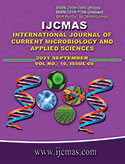


 National Academy of Agricultural Sciences (NAAS)
National Academy of Agricultural Sciences (NAAS)

|
PRINT ISSN : 2319-7692
Online ISSN : 2319-7706 Issues : 12 per year Publisher : Excellent Publishers Email : editorijcmas@gmail.com / submit@ijcmas.com Editor-in-chief: Dr.M.Prakash Index Copernicus ICV 2018: 95.39 NAAS RATING 2020: 5.38 |
Intestinal helminth infections are caused by soil-transmitted helminths (STH). Worm infections are classified as neglected diseases, namely infections that are not noticed and are chronic diseases, rarely cause clear clinical symptoms and the impact is only seen in the long term. STH infection affects the immune response in humans in the form of increased levels of immunoglobulin E (IgE), eosinophilia and production of t-helper 2 (Th2), especially to changes in TNF-α and IL-4 levels. The purpose of this study was to determine the analysis of TNF-α and IL-4 levels with soil-transmitted helminths infection in adults. The research design used was case control, with a multistage-random sampling technique. Stool samples were taken from 127 adults and 24 subjects (18.9%) were infected with STH using the kato katz examination method. Furthermore, 24 STH-infected subjects and 24 healthy control subjects were taken using enzyme-linked immunosorbent assay (ELISA). The study population was male and female adults aged 20-60 years as many as 48 people. The data was carried out by independent t-test (p<0.05) and it was considered that there was a significant relationship. c. The results showed that there was a significant difference in TNF- levels in adults in the STH-infected group and healthy yangiene with p value = 0.001 and there was a significant difference in IL-4 levels in adults in the STH-infected group with p value = 0.001. The conclusion of this study is that there are differences in TNF- levels lower in STH-infected people than healthy controls and higher IL-4 in STH-infected people than healthy controls in adults.
 |
 |
 |
 |
 |